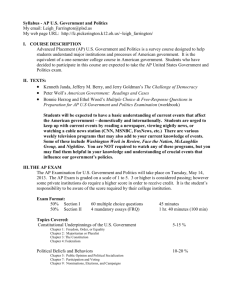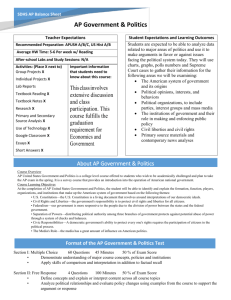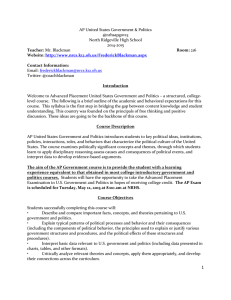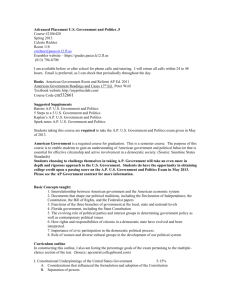Ap Gov Student syllabus 2014
advertisement
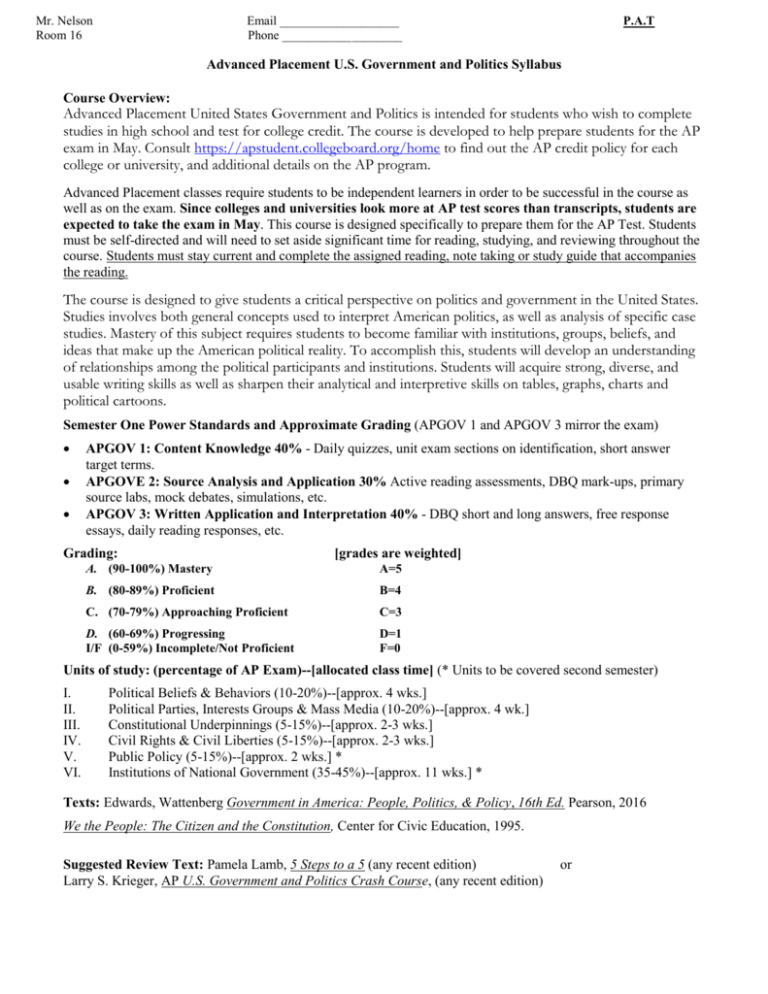
Mr. Nelson Room 16 Email ___________________ Phone ___________________ P.A.T Advanced Placement U.S. Government and Politics Syllabus Course Overview: Advanced Placement United States Government and Politics is intended for students who wish to complete studies in high school and test for college credit. The course is developed to help prepare students for the AP exam in May. Consult https://apstudent.collegeboard.org/home to find out the AP credit policy for each college or university, and additional details on the AP program. Advanced Placement classes require students to be independent learners in order to be successful in the course as well as on the exam. Since colleges and universities look more at AP test scores than transcripts, students are expected to take the exam in May. This course is designed specifically to prepare them for the AP Test. Students must be self-directed and will need to set aside significant time for reading, studying, and reviewing throughout the course. Students must stay current and complete the assigned reading, note taking or study guide that accompanies the reading. The course is designed to give students a critical perspective on politics and government in the United States. Studies involves both general concepts used to interpret American politics, as well as analysis of specific case studies. Mastery of this subject requires students to become familiar with institutions, groups, beliefs, and ideas that make up the American political reality. To accomplish this, students will develop an understanding of relationships among the political participants and institutions. Students will acquire strong, diverse, and usable writing skills as well as sharpen their analytical and interpretive skills on tables, graphs, charts and political cartoons. Semester One Power Standards and Approximate Grading (APGOV 1 and APGOV 3 mirror the exam) APGOV 1: Content Knowledge 40% - Daily quizzes, unit exam sections on identification, short answer target terms. APGOVE 2: Source Analysis and Application 30% Active reading assessments, DBQ mark-ups, primary source labs, mock debates, simulations, etc. APGOV 3: Written Application and Interpretation 40% - DBQ short and long answers, free response essays, daily reading responses, etc. Grading: [grades are weighted] A. (90-100%) Mastery A=5 B. (80-89%) Proficient B=4 C. (70-79%) Approaching Proficient C=3 D. (60-69%) Progressing I/F (0-59%) Incomplete/Not Proficient D=1 F=0 Units of study: (percentage of AP Exam)--[allocated class time] (* Units to be covered second semester) I. II. III. IV. V. VI. Political Beliefs & Behaviors (10-20%)--[approx. 4 wks.] Political Parties, Interests Groups & Mass Media (10-20%)--[approx. 4 wk.] Constitutional Underpinnings (5-15%)--[approx. 2-3 wks.] Civil Rights & Civil Liberties (5-15%)--[approx. 2-3 wks.] Public Policy (5-15%)--[approx. 2 wks.] * Institutions of National Government (35-45%)--[approx. 11 wks.] * Texts: Edwards, Wattenberg Government in America: People, Politics, & Policy, 16th Ed. Pearson, 2016 We the People: The Citizen and the Constitution, Center for Civic Education, 1995. Suggested Review Text: Pamela Lamb, 5 Steps to a 5 (any recent edition) Larry S. Krieger, AP U.S. Government and Politics Crash Course, (any recent edition) or Some Suggested Web Sites for Review: http://www.collegeboard.com/student/testing/ap/sub_usgov.html?usgovpol (Course Information) http://www.centerforpolitics.org/crystalball/ (Center for Politics—Election Predictions) http://www.committeeforjustice.org/ (The Committee for Justice focuses on judicial nominations) http://www.newslink.org/news.html (links to major news sites) http://thomas.loc.gov/ (Congressional record) http://www.vis.org (Report cards on Congress to help voters) http://www.politicalindex.com or http://opencongress.org (connections to state and national candidates and parties) http://www.law.cornell.edu/ (case law) http://www.oyez.org/ (case law) http://www.aclu.org (American Civil Liberties Union) http://www.nationalreview.com (conservative site for current issues) http://www.freedomforum.org/first/ (First Amendment Website) http://usconstitution.net (current events as well as historical sites) http://politicalcartoons.com and http://cagle.com (political cartoons) http://www.oregon.gov (links to state and local government) http://www.lawresearch.com/v2/csor.htm (single most valuable site on Oregon) http://phs.prs.k12.nj.us/ewood/amergov/index.htm (Test Review site) http://boballey.org/trinity/exam_review.htm#Chapter%20Three-Federalism (Test Review site) First Semester Reading Schedule: 1. 2. 3. 4. Political Beliefs/Political Behaviors Government in America: Chapters 1 & 9-10 Selected Supplemental Readings Political Parties, Interest Groups & Media Government in America: Chapters 6, 7, 8, & 10 We the People: Lessons 20 & 26 Selected Supplemental Readings Civil Liberties & Civil Rights Government in America: Chapters 4-5 We the People: Lessons 23-40 Selected Supplemental Readings Constitutional Underpinnings Government in America: Chapters 2-3 We the People: Lessons 1-22 Selected Supplemental Readings Public Policy Government in America: Chapters 14, 17-20 5.


